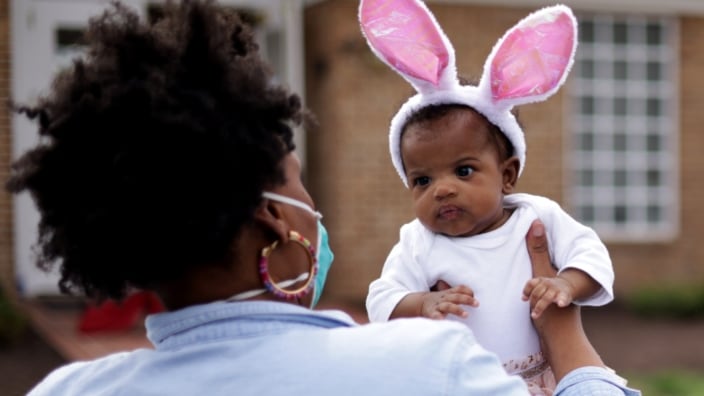Babies, toddlers spread COVID-19 more easily than teens: study
A Canadian study has found that younger kids may pose a greater risk of passing the virus on to others than older children.
A Canadian study into the transmission of COVID-19 has found that younger children may pose a greater risk of passing the virus on to siblings and caregivers than older children.
According to the Journal of the American Medical Association, researchers studied the household transmission of at least one secondary case of coronavirus within one to 14 days of a pediatric diagnosis.
A woman holds her baby in March at a low-key Easter celebration in Virginia held in a safer environment than the usual neighborhood event because of the COVID-19 pandemic. (Photo by Alex Wong/Getty Images)
More than 6,200 households were examined in which the first person to catch the virus was under the age of 18, then researchers looked to find out who was the next person in the house to fall ill. In nearly 30% of cases, the child passed the virus to another member of the household.
The study does not conclude that toddlers are driving transmission of the virus in households, but instead illustrates that even very young children can spread COVID-19.
In fact, the JAMA study notes that children aged 3 or younger make up just 12% of initial COVID cases, while children between 14 and 17 make up 38%. Still, the odds of transmission were 40% higher when the toddler was the initial patient than when it was the older child.
Behavioral patterns of small children, like putting items in their mouths and close physical contact with family members, have been cited as a possible reason for the spread.
“The key takeaway for me is that it clearly shows that there’s transmission from children occurring in the household,” Dr. Zoe Hyde, an epidemiologist who was not involved in the research but read the study, told The New York Times. “This means we urgently need to think about how we’re going to protect schools when they reopen shortly.”
Young children, particularly infants and toddlers, can become ill with the virus. However, as with older adults and children, younger kids may suffer more severe symptoms if they have underlying conditions.
Vaccines are currently not authorized for children under 12.
The Mayo Clinic recommends that the caregivers of small children continue to wear masks to protect the babies and themselves. Further, experts recommend throwing away tissues after a toddler may use them and frequent hand washing to protect children and adults.
The Centers for Disease Control and Prevention recommends that children over the age of 2 wear masks when outside of their household. Further, they recommend that schools and daycare centers maintain good physical distancing, ventilation and testing.
Have you subscribed to theGrio’s “Dear Culture” podcast? Download our newest episodes now!
TheGrio is now on Apple TV, Amazon Fire and Roku. Download theGrio.com today!
The post Babies, toddlers spread COVID-19 more easily than teens: study appeared first on TheGrio.

